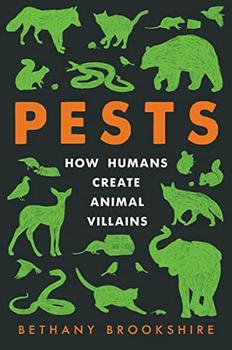Summary | Excerpt | Reviews | Beyond the Book | Readalikes | Genres & Themes | Author Bio

How Humans Create Animal Villains
by Bethany Brookshire
Throughout history, wolves were a source of fear and loathing. Killing wolves was a way of imposing order over chaos, civilization over barbarism. According to William of Malmesbury (writing in the twelfth century), after Edgar took the throne of England in 959, he could have continued demanding from the Welsh a payment of gold and silver imposed by his uncle, Aethelstan. Instead, he demanded three hundred wolfskins a year.
Wolfskins were probably not having a fashion moment in Edgar's court. The new tribute had a purpose—persecution of a pest. More wolfskins meant fewer wolves, and fewer wolves probably meant more sheep grazing the grassy hills of Wales. The wolfskin tribute stood for only three years. After that, William says, Wales seems to have run out of wolves.
The English nobility continued to hunt wolves across the rest of the island for centuries. The slaughter worked. By the mid-sixteenth century, Little Red Riding Hood could have traipsed through England and Wales in safety (though she might have wanted to avoid Scotland and Ireland for another two centuries).
Across the Atlantic, in the United States, starving Jamestown colonists faced wolves in 1609, and a Massachusetts Bay colonist beat one off with a stick in 1621. Colonists expanding across the continent shot them to protect their cattle and sheep. But they also killed them because wolves ate deer, elk, and other animals that humans wanted for their own meals.
This arises out of a utilitarian view of both animals and landscape, says Adrian Treves, head of the Carnivore Coexistence Lab at the University of Wisconsin–Madison. In a utilitarian view, people are not part of nature. Nature exists, complete with animals, to serve people. In that view, Treves says, anything that eats livestock—wolves, coyotes, anything—is a "nuisance" or a "problem" animal. A problem that needs to be solved by getting rid of the species in question.
That sense of dominion, the idea that the world is ours for the taking, runs through a lot of Western history. "I would say the whole human nature dichotomy has been argued to be a Western construct," says bethany ojalehto mays, a cultural psychologist at Cornell University. "So much of our life is constructed in a way that what is human is partitioned from what is natural, and we have created a lot of things that make sense of that divide." Aristotle put humans above the animals, Descartes declared them no more than living machines.
Colonists had this utilitarian view. But not everyone does. Some Indigenous groups see wolves (Ma'iingan in the Anishinaabe languages) as kin, fellow predators in the world. In the Anishinaabe creation story, when the Creator made the first human, the man was lonely. So the Creator made not a woman but a ma'iingan. Man and ma'iingan lived together, traveled together, and together they named the world. Finally, the Creator said that the two would have to go their separate ways. But the Creator also told them they were tied together for eternity, that "whatever happened to one would happen to the other. Each would be feared, respected, and misunderstood by the people who would later join them on earth."
To the colonizing people, wolves were, and sometimes still are, considered both predator and pest. They cut into ranching profits with their carnivorous ways. Into the twentieth century, states and the federal government gave bounties to hunters to trap them, poison them, and hunt them down with dogs. (States offered $20 to $50 per wolf, about $280 apiece today.)
Bounties against wolves continued until the wolf gained protection with the Endangered Species Act of 1973. By then, wolves had been almost eradicated from the lower forty-eight states. Humans had won, defeating the predator and the pest. Little Red Riding Hood could have embarked on a world tour.
And then, something strange happened. The colonists became confident victors. Wolves became vulnerable. The balance of power had shifted. Wolves, Ritvo explains, "[stop] being a pest when they can't hurt you anymore." Settlers had killed off so many that our livestock were no longer in any danger, and the deer bred in peace.
Excerpted from Pests by Bethany Brookshire. Copyright © 2022 by Bethany Brookshire. Excerpted by permission of Ecco. All rights reserved. No part of this excerpt may be reproduced or reprinted without permission in writing from the publisher.
On the whole, human beings want to be good, but not too good and not quite all the time
Click Here to find out who said this, as well as discovering other famous literary quotes!
Your guide toexceptional books
BookBrowse seeks out and recommends the best in contemporary fiction and nonfiction—books that not only engage and entertain but also deepen our understanding of ourselves and the world around us.